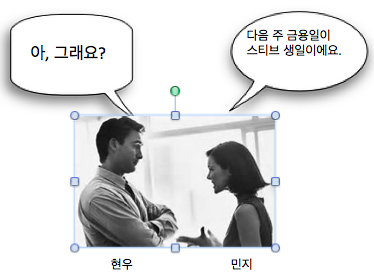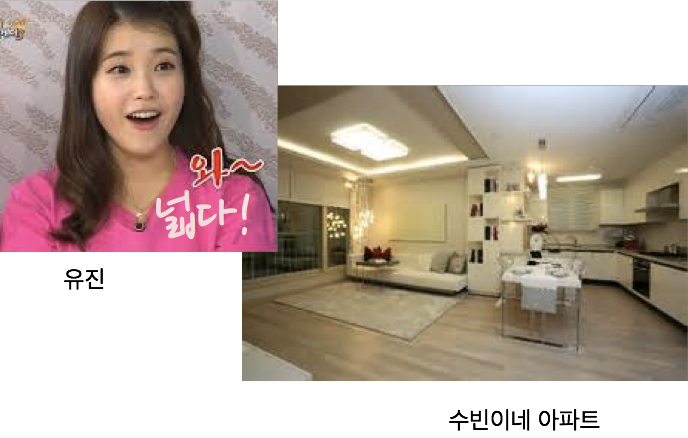| ~던데 . . . : Reacting to or drawing reacton from the other person's by referring to the perceptual experience of a situation in the past that is relevant to the current issue |
| 현우: | 다음 주 금요일이 스티브 생일이라던데.* |
| 유진: | 아, 맞아. 깜빡 잊어버렸네. 우리 스티브 생일 파티 해 줄까? |
| 현우: | 그래, 그러자. 근데 어디서 하지? |
| 유진: | 지난 번에 보니까 수빈이 아파트가 넓던데.** |
| 현우: | 그래. 내가 한번 물어볼게. |
 |
 |
| (이틀 전) | (3주 전) |
[NOTE]
[. . .~다/라]던데 (< [. . .~다/라]고 하던데) is a ~던데 construction combined with indirect quotation; ~라 is used when the predicate in the quoted proposition is the copula -이, that is, [. . -이에요/예요/(이)야/이다]+ 고 하다 > . . .-(이)라고 하다.
~더, as in the noun-modifying form ~던, points to a particular moment in the past when you experienced (witnessed, perceived, observed) a certain situation; that is, you describe the situation as the way you experienced it in the past. ~(으)ㄴ데 refers to a background circumstance. Combined together ~던데 indciates that the state or event of affair you are describing has a bearing on the current situation at stake (usually but not necessarily described by the preceding utterance). The interpretation of the nature of the relevance is up to the listener.
* 현우 is recalling the moment (indicated by ~더-) when somebody told him that next Friday is Steve's birthday.
민지 said, "다음 주 금요일이 스티브 생일이에요."
=> 민지가 다음 주 금요일이 스티브 생일이라고 했어요.
** With regard to the issue of where to hold a party raised by 현우, 유진 has recalled the moment when she saw 수빈's spacious apartment.
"와아, 넓다."
춤 잘 추던데요
어제 뵙는데 괜찮던데
~던데 can be used in response to a question, but as something that falls short of being a direct answer because it only refers to what you experienced/cognized at a moment in the past.
| (1) | A: | 새로 생긴 한국 식당에 가 봤어요? 맛이 어땠어요? |
| B: | 네, 지난 주에 가 봤어요. 맛있던데요? | |
| (2) | A: | 한국에 가 봤어요? 한국 어때요? |
| B: | 네, 가 봤어요. 너무 복잡하던데요/맛있는 음식이 많아서 좋던데요? | |
| (3) | A: | Steve 못 봤어요/어디 있어요? |
| B: | 아까 도서관에 있던데 . . . | |
| (4) | A: | 스티브 생일인데 무슨 선물 줄 거예요? 영화 DVD를 주면 어떨까요? |
| B: | 스티브는 영화를 안 좋아하는 것 같던데 . . . |
[NOTE] ~던데 could have a rising intonation as if you ask the other person to take up, or in an intonation of soliloquy, particularly when you want to avoid any responsibility for the information conveyed.
Speaking practice
1. Exchange a dialogue regarding the following items. The first speaker raises an issue about them and the second speaker responds by making a reference to a past moment when he or she experienced/cognized. See the above examples as a model.
2. For a given question or statement, react by recalling a situation in the past that has a relevance to the previous utterance.
보기
A: New Year's Eve (작년 마지막 날 밤)에 뭐 했어요? B: 교회에서 떡국 먹고 윷놀이 했어요. [See 제11과 Culture notes] A: 재미있었어요? B: 네, 오래간만에 해 봤는데 재미있던데요.
3. Imagine it is someone's birthday. Exchange a dialouge about what to do with the birthday. The issues are what present you should give, what present the person would like, whether there has been any proposal about the birthday, if the person likes or dislikes any particular kind of gift. etc.
Step1. Say you've heard about an event/occasion:
다음 주 금요일이 스티브 생일이래. 무슨 선물을 주면 좋을까?
Step 2. Express your thought or wonder about what to do:
그러지 않아도 무슨 선물을 할까 생각 중이야?
생일 파티를 하면 어떨까?
스티브 영화 구경 시켜 줄까?
Step 3. Recall a past moment when you you were told about or observed/witnessed/experienced, a circumstance that is relevant to the current issue:
스티브는 컴퓨터 게임을 좋아하던데 . . .
성희가 자기 아파트에서 파티를 하자고 하던데/하자 그러던데 . . .
스티브는 영화를 안 좋아하던데 . . .
스티브 다음 주 금요일에 집에 간다 그러던데 . . .